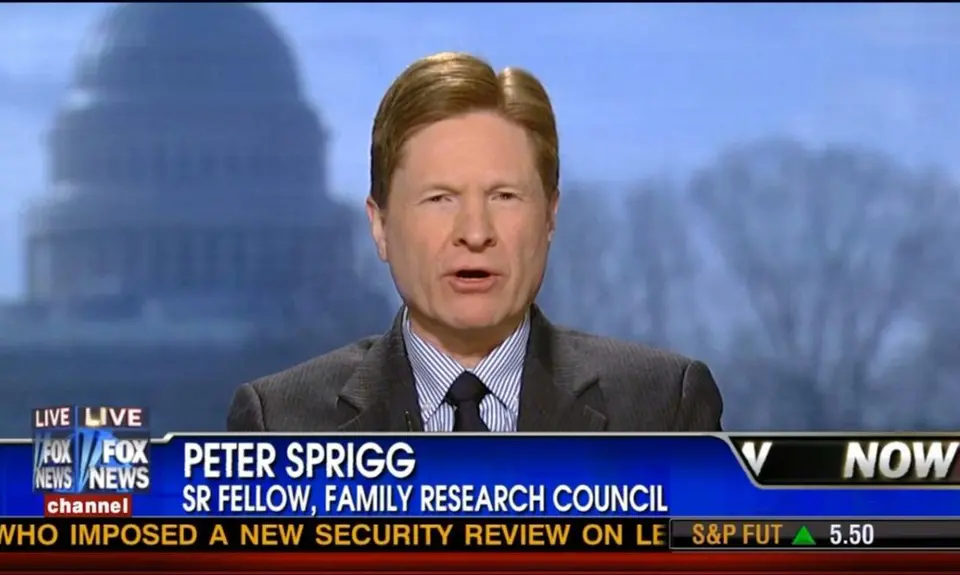The Family Research Council's Peter Sprigg published a post on the FRC's blog today urging the Senate to grill Kristin Goodwin about any "homosexual conduct" she may have engaged in prior to the repeal of Don't Ask, Don't Tell in 2011.
As we noted last week, anti-LGBTQ activists are up in arms over Goodwin's nomination to serve as a commandant of cadets at the U.S. Air Force Academy because she is a lesbian. In his post, Sprigg urged Senate Republicans to make Goodwin's sexual history a focus of questions during her confirmation hearing.
Sprigg states that, contrary to popular belief, the Don't Ask, Don't Tell regulations enacted by the Department of Defense under President Bill Clinton in 1994 differed from the law that was enacted by Congress at the time regarding the issue of homosexuality in the military.
DOD regulations declared that "sexual orientation is considered a personal and private matter, and homosexual orientation is not a bar to service entry or continued service unless manifested by homosexual conduct,” and Sprigg notes that, under the law, engaging in "homosexual conduct" was grounds for dismissal:
The law also declared flatly that “A member of the armed forces shall be separated from the armed forces” [emphasis added] if it was found: (1) That the member has engaged in, attempted to engage in, or solicited another to engage in a homosexual act or acts . . .
(2) That the member has stated that he or she is a homosexual or bisexual, or words to that effect . . .
(3) That the member has married or attempted to marry a person known to be of the same biological sex.
...
The actual law enacted by Congress, however, made clear that all three elements of a “homosexual orientation”—attractions, conduct, and self-identification—remained problematic for the military. The statement, “The presence in the armed forces of persons who demonstrate a propensity [emphasis added] or intent to engage in homosexual acts would create an unacceptable risk,” addresses sexual attractions. And both the conduct (“the member has engaged in . . . a homosexual act”) and the self-identification (“the member has stated that he or she is a homosexual”) remained grounds for separation from military service. This was the state of the law until September 2011.
Goodwin graduated from the Air Force Academy in 1993 and Sprigg argues that if she engaged in any "homosexual conduct" prior to 2011, then she violated the law and is incapable of upholding the Air Force Honor Code.
As such, he insists that the Senate question Goodwin on this matter during its hearings:
In light of this, it should be clear that the issue involving Goodwin’s integrity is not just limited to how she may or may not have answered a question in 1993 or 1994. Whether she complied with federal law regarding eligibility for military service relates to both her sexual conduct and her sexual attractions at any point up until September 2011.
To be specific—if anyone at any point during Goodwin’s accession into the military and the repeal of the 1993 law in 2011, engaged in a homosexual act, they would have been in violation of the law (both the 1993 law and possibly the law against sodomy in the Uniform Code of Military Justice) and subject to separation from the military. If, during that time, a person experienced same-sex sexual attractions, it could be interpreted as “a propensity . . . to engage in homosexual acts.”
In my research on Goodwin’s career, I have not found any published evidence that she violated the law. [Mikey] Weinstein, citing a source he says spoke with Goodwin, declared in his complaint that Goodwin “relates that she did not become aware of her sexual orientation until well after DADT went into effect.”
However, there is nothing to prevent members of the Senate from raising these questions, as well as questions about her commitment to freedom of speech and religion for cadets. They may be crucial to determining whether she is suitable for promotion, or fit to command the Air Force Academy—and, as God and Country pointed out, to oversee its honor code.






